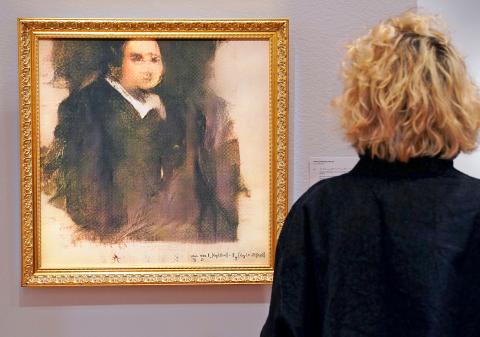A portrait made by algorithm on Thursday smashed new boundaries, selling for US$432,500 and becoming the first piece of artificial intelligence (AI) art sold at a major auction house, Christie’s said.
At first glance, Edmond de Belamy, the portrait of a gentleman dressed in black and framed in gold, could be any standard portrait from the 18th or 19th century.
Up close, the image is more intriguing. The face is fuzzy and the picture seemingly unfinished. Instead of an artist’s signature, it bears the stamp of a mathematical formula on the bottom right.

Photo: AFP
It is the brainchild of French collective Obvious, whose aim is to use AI to democratize art. To make the painting, artist Pierre Fautrel ran 15,000 classic portraits through computer software.
Once the software “understood the rules of portraiture,” using a new algorithm developed by Google researcher Ian Goodfellow, it generated a series of new images by itself, Fautrel said.
The French collective selected 11, calling them the “Belamy family,” one of which on Thursday fetched US$432,500 at Christie’s in New York, the epicenter of the traditional art market.
The price smashed its presale estimates of US$7,000 to US$10,000.
Christie’s said that the work was snapped up by an anonymous telephone bidder after a five-way battle between telephone and online bidders, and one bidder in the room.
Is it a work of art? Fautrel, 25, insisted that it is.
“Even if the algorithm creates the image, we are the people who decided to do this, who decided to print it on canvas, sign it as a mathematical formula, put it in a gold frame,” he said.
He compared AI art to early photography of the 1850s, which he said critics rubbished at the time as “not being art and which would destroy artists.”
Christie’s international head of prints and multiples Richard Lloyd persuaded the collective to put the print up for sale to foster a debate about AI in art, he said.
“I know it’s a debate that’s going on quite widely. I thought that in a way this marked a watershed — or slightly a tipping point,” Lloyd said.
Leaving aside the art debate, there are legal questions. Is the collective or the algorithm the artist? What are the copyright issues?
For Lloyd, this is just the beginning of AI art, he said.
“This is developing incredibly fast. Only in five or 10 years we will look back on this and it will look very different,” he said.
“Artists who are great adopters of technology, they will seize AI,” he predicted. “Artists will use it to generate images which they will then modify ... It will be quite seamless.”

The US dollar was trading at NT$29.7 at 10am today on the Taipei Foreign Exchange, as the New Taiwan dollar gained NT$1.364 from the previous close last week. The NT dollar continued to rise today, after surging 3.07 percent on Friday. After opening at NT$30.91, the NT dollar gained more than NT$1 in just 15 minutes, briefly passing the NT$30 mark. Before the US Department of the Treasury's semi-annual currency report came out, expectations that the NT dollar would keep rising were already building. The NT dollar on Friday closed at NT$31.064, up by NT$0.953 — a 3.07 percent single-day gain. Today,

‘SHORT TERM’: The local currency would likely remain strong in the near term, driven by anticipated US trade pressure, capital inflows and expectations of a US Fed rate cut The US dollar is expected to fall below NT$30 in the near term, as traders anticipate increased pressure from Washington for Taiwan to allow the New Taiwan dollar to appreciate, Cathay United Bank (國泰世華銀行) chief economist Lin Chi-chao (林啟超) said. Following a sharp drop in the greenback against the NT dollar on Friday, Lin told the Central News Agency that the local currency is likely to remain strong in the short term, driven in part by market psychology surrounding anticipated US policy pressure. On Friday, the US dollar fell NT$0.953, or 3.07 percent, closing at NT$31.064 — its lowest level since Jan.

The New Taiwan dollar and Taiwanese stocks surged on signs that trade tensions between the world’s top two economies might start easing and as US tech earnings boosted the outlook of the nation’s semiconductor exports. The NT dollar strengthened as much as 3.8 percent versus the US dollar to 30.815, the biggest intraday gain since January 2011, closing at NT$31.064. The benchmark TAIEX jumped 2.73 percent to outperform the region’s equity gauges. Outlook for global trade improved after China said it is assessing possible trade talks with the US, providing a boost for the nation’s currency and shares. As the NT dollar

PRESSURE EXPECTED: The appreciation of the NT dollar reflected expectations that Washington would press Taiwan to boost its currency against the US dollar, dealers said Taiwan’s export-oriented semiconductor and auto part manufacturers are expecting their margins to be affected by large foreign exchange losses as the New Taiwan dollar continued to appreciate sharply against the US dollar yesterday. Among major semiconductor manufacturers, ASE Technology Holding Co (日月光), the world’s largest integrated circuit (IC) packaging and testing services provider, said that whenever the NT dollar rises NT$1 against the greenback, its gross margin is cut by about 1.5 percent. The NT dollar traded as strong as NT$29.59 per US dollar before trimming gains to close NT$0.919, or 2.96 percent, higher at NT$30.145 yesterday in Taipei trading